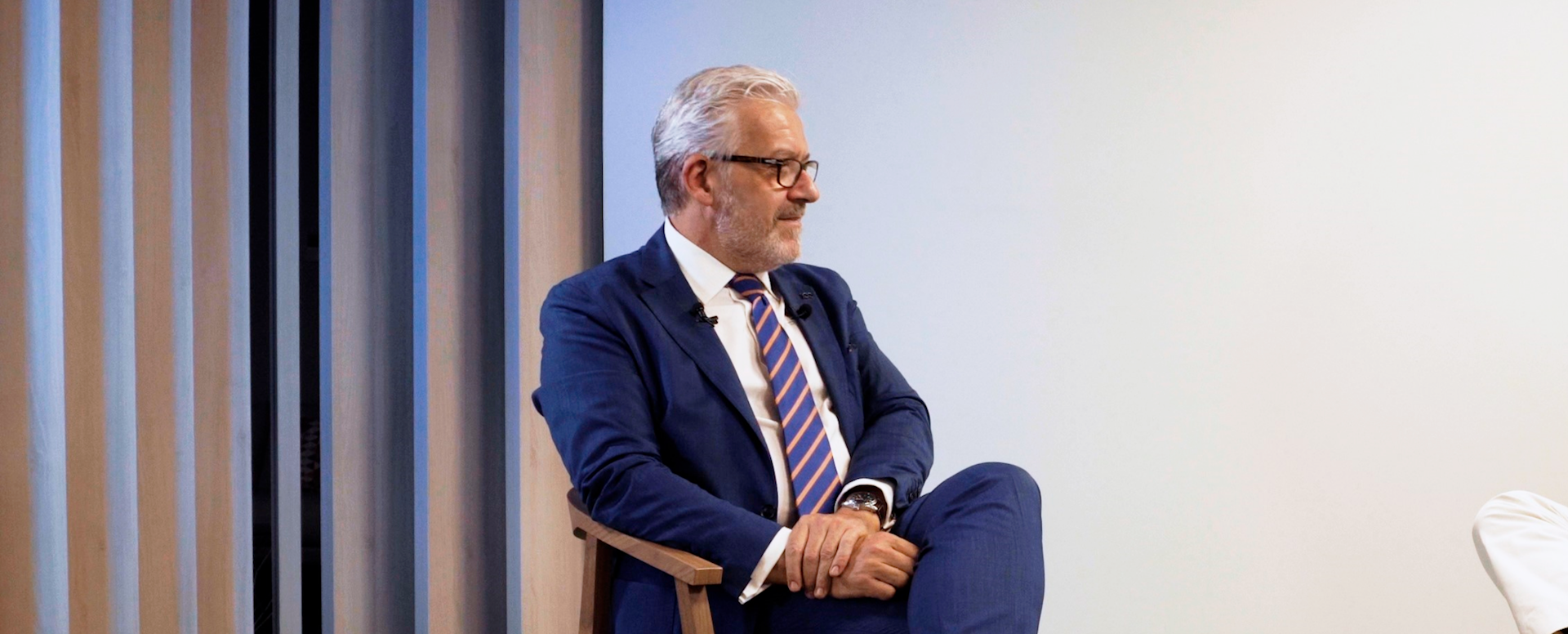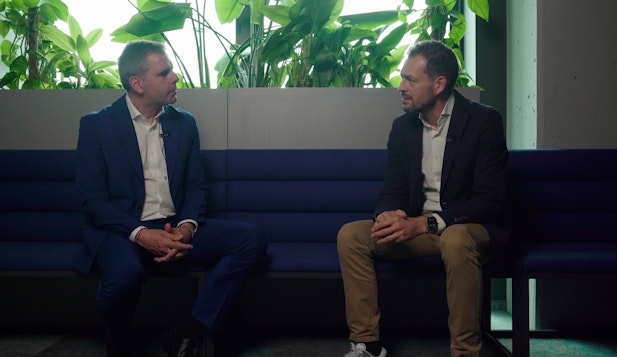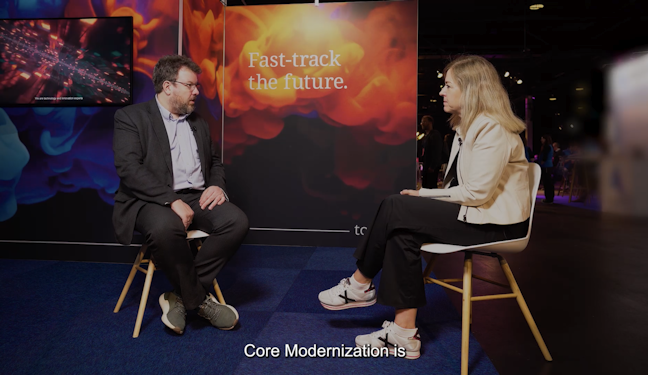
Santalucía's Vision on Today's Talent and Culture Challenges
Role of People functions in today’s challenging world. How strategic it is to business? How sustainable it can be across time with changes happening very constantly? These are some of the questions raised by Juan Antonio Rossell, Talent & Transformation Partner at NTT DATA EMEAL, and Juan Manuel Rueda, CHRO, Organization and Communication Director at Santalucía, to which they give answer in this Dialog.
Speakers
Juan Antonio Rossell
Talent & Transformation Partner
Transcription
Welcome to Insurance Dialog. Today we have Juanma Rueda, General Manager of People, Organisation and Communication joining us. Good evening!
Good evening, thank you so much for the invitation.
Thank you for joining us on this day. I wanted to start the conversation Juanma, by asking you about the role that HR (Human Resources) has in this day and age.
Traditionally, it had had a role that was a bit distanced from the business, but in later years, luckily, it became a lot closer to the strategy and the business itself. I wanted to formulate this question: To what degree this role can be sustainable? In the way that it functions now.
This is a big question.
We are asking ourselves this question, at least since I started this job, more than 30 years ago. This strategic role of HR, or people. We are more modern and talk about people. Let’s see. The question is not whether we are strategic, it is whether the position is strategic. The position always has been strategic, always. 30, 50 years ago and right now. The question is if we are.
What I mean is, are we capable of transforming our role in the strategic sense of the business? What happened to us in the last few years has indeed made the role of people even more central, because suddenly the sole focus was on that.
A unique situation was put in the hands of the people, in the hands of the business. That’s why I believe that we need to take this opportunity. The opportunity that was given to us and don’t let go of it by any means. But there’s nothing new.
It is the same, exactly the same. Are we strategic? Of course, we are. We need to forget these notions of questioning our position every second or if we are partners in the business. I am not a business partner; I am the business. That is the slogan, at least mine. I am business. I have the second-best result in my company. How am I not making business deals? If all the cost structure depends on my organisation. My organisation depends almost entirely on us. So, of course, I am. It’s not whether I am strategic or not. I am pure business.
Great! From the point of view of being the business, how do you think we should prepare the companies for all the changes that are coming, even more, these last years?
We are talking about the pandemic, about remote work. We are talking about flexibility. How? How, in a way, can we help the company? What type of leadership promote or what do we need to follow to prepare the company for this list of constant changes that we are facing these last years?

We can take a lot out of this; we can even make a few jokes about it. Because, let’s face it, I don’t know why, but in the last few years, we created these tasks for ourselves: being the first at everything. Everything happened for the first, all at once. We never had a pandemic, a snow blizzard, or a volcano exploding, all at the same time. At the same time, we didn’t have, almost, a war in Europe or a crisis in whatever, or a crisis in the crisis of another crisis. Or inflation that right now is almost at 10%.
Almost none in this profession has worked on this. Ever. Then how do we prepare our company? I don’t know, but the company itself is taking care of it. I don’t know which ability is needed, but the capability to anticipate surprising situations, the ability to invest, and take care of them. Now that, I think presents almost a universal value.
What will we need to do in the future? Honestly, what is the next thing that is going to happen to us? Because all that I’ve said seems fake. I don’t know… A general aerolite can smash you; you can be invaded by someone, an alien can invade you, I don’t know. Something can happen to you, and you must consider this, so the organisation can stay fresh, and have this ability to, I wouldn’t say improvise but have ways of thinking about how to act, adequate and anticipate what can happen to you.
Saying that you have an organisation ready for the future seems like a sci-fi concept right now. Truthfully, you don’t know what can happen to you the next second.
We were told that in “the famous 2021” the crisis would have been over. However, it was a year that could have been but never was. Or that in 2022 we would stabilise. And suddenly we have the first trimester of 2022, and the year becomes a total outlier. And that we will be taking care of levels of inflation around .2% even deflective to levels of 10%.
All this happens at the same time. The company must be able to adapt. We precisely can offer the company the biggest strengths, starting with HR. Our capability to adapt, constantly looking for an alternative, a Plan B or C, is what we did on the 14th of march of 2020 (1st lockdown in Spain), when almost everybody took their things, left and never came back.
And business still worked, whose could, some came back and left and came back. Now we are another challenge: adaptive and flexible leadership.
Understood. In the end, we find leaders in the people. And, right now, we have a battle for talent, even more for digitalised profiles. What resources can we offer the employee, from the value point of view? To, firstly, bring them to our company and, secondly, retain them with us? To help them develop, grow and motivate inside our company?
Engage them, as we say nowadays. What do for the employee to start all this, to optimise it?
The first thing is almost an advice: Do not listen to the economy newspaper’s headlines. I believe that the first and foremost obligation of a Manager is knowing themselves, perfectly knowing their business and their people.
Is the battle for talent a commodity or a banal discussion? It looks like a bar row. “We have a talent problem”. It depends. Why won’t we analyse the data? Data has this ability… Suddenly we have all these issues that are interesting for the newspaper, and we have: “The great resignation”.
Ok, I get it. In the USA, 165 million people were in active employment in 2001, there were somewhere around 40 million resignations, almost 29% of the market. That’s a problem, anywhere. In Spain, almost 20 million, 19 million 750-800 thousand, as of the 31st of December of 2021 we had 30 thousand resignations. The .15%. Is it a problem deserving of a headline? Is it a company´s problem? Honestly, is it a country’s problem? It’s not. It’s another thing, ok? But it is not a problem. It’s not to worry about, it’s to take care of. However, there are certain places where they do have a battle for talent. And you pointed out it. Some profiles are battled for. And in this case, of course, the organisations that are trying to attract this talent and keep it, I don’t want to talk about keeping it because it seems that we are in prison, that we are in a strange place
Build loyalty, I would say. We have to make a better value proposition, understand what they need, what they want, what they ask for, these collaborators, workers. And put it into practice and try that your company adapts carefully, very carefully.
Building the discourse of saying yes is easy, it’s not as easy to build why not. Why do you can? You can telework or leave for two weeks for the Portuguese coastline. But, in my case, I have a lot of workers that have to come to work every day.
This situation generates problems inside the organisation and comparative grievances. People always understand comparative grievances when it’s others, but when it happens to them, they understand it a lot less. So, it’s an interesting debate, but it’s a debate that every company has and that every company has to focus on its organisation.
A colleague of mine, rather ironically, and perhaps a bit wickedly (from my point of view) used to tell me: “This, this is a discussion between snobs in “The Upper East Side” or “Notting Hill”. When you go to the southern neighbourhoods this problem does not exist.” What this means is that you must understand your organisation pretty well and maybe you can implement some of these solutions but in other companies, you can’t. Ask Meliá. Tell Meliá, for example, about remote work.
I think that you bring a great point to the table. Because a lot of times we try to treat everyone the same way, all the different people in the company. And often we see that segmentation is key, also heterogeneity, there are a lot of businesses like yours In your corporation, you have a lot of businesses. Also, I understand that segmentation, not only at the profile level or type of individual but at the business level is important, don’t you think? To achieve personalisation in the offering value or talent management. In this sense, do you consider that is something characteristic of the corporation or to the Insurance Industry or even other fields (the need to segment a lot)?
Nowadays, I believe this is the only interesting revolution that exists in our profession. Is: “Please, I need more marketing profiles in “my house”, data analyst and marketing”. Because it’s true what you are telling me. Possibly, I think that, since competence management, or whatever, or any of these new forms of management, there hasn’t been anything more interesting than this. The HR has to be a marketing team on the inside. It has to understand, perfectly, who is its client. We have two big clients. The business on the one hand, and on the other hand our colleagues, our people. We must understand perfectly what the needs of each group are, and not every group is identical. That’s the reason why we design from this exhaustive knowledge that data give us. Finally, we have the ability to analyse data smartly.
It’s not only about knowing what day you were born or what to send you for your birthday or what must pay you your salary. In addition, having this data that allows me segmentate my value offering, in a smart way. Because it’s true, I can’t offer every segment the same, because I cannot, and not every person needs the same.
It’s true that there is this coexistence between different profiles in the organisation (different segments). I don’t talk about generations, because I don’t even know...
If we are on gen Y or Z.
Exactly. I’m not talking about that; I’m talking about needs. For example, there are twenty-five-year people, who are more traditional. People have discovered during the pandemic, during the COVID management: Look, this thing about work-life balance and being able to work from home is a very interesting topic for them, and they put it in the centre of their life. For example, we can make that people of a certain age could still work in the company, even more in a deflective market of competences. But we are having the luxury of putting out of work people with 50 or 60 years that are in their intellectual prime.
It’s true that we need to know what kind of value offering we are providing them with. It has a big problem. It collides with our collective labour relationships, basically and to sum it up simply, it’s everyone’s coffee. Here all are the same, everyone is whatever. And that has been our model since the creation of the industrial relationship model.
And, of course, this collides directly with our segmentation, it collides with our individual value offering and here is where I find the greatest challenge of the future. How do we make both things work?
And come together in a way? Good point. Bringing back what you were saying before about data, the importance of data to be able to segment, and obtain information.
Clearly, technology has relevance in the personal sense. However, I talk to different clients and HR managers, because sometimes you find conflicting views. For example, regarding data, it always comes to mind the topic of what happens to data privacy, and to which point the ability to measure, for example, productivity makes sense. If take another technology such as AI (Artificial Intelligence), it is also said that the service is dehumanised. This thing about an employee having some doubts and using a chatbot, instead of a technician. There are always some pros and cons when we talk about technology.
Or the atomisation topic, you also find HR managers telling you: “Yes, but if we automate too much, what do we do with the people currently doing these tasks?”. In the end, is about doing more valuable tasks.
Finally, virtual reality like the metaverse, that is all we can hear about right now, it is also said that it dehumanises the relationship, because it makes you do everything through a screen. So, how do you live or how do you think we can look for an equilibrium benefiting from the best in technology, without losing this personal aspect?
It’s curious and contradictory that it dehumanises the relationship, however, everyone wants to work from home, and they don’t mind seeing each other on Teams if they are at the beach.
It surprises me.
It’s paradoxical.
Paradoxical, at least paradoxical. “No, no, that dehumanises the relationship”. Ah, but everyone in a chat, in Teams of 20 people or whatnot, everyone in a corner without turning the camera on and without seeing each other. As it seems, that is not dehumanising. It’s at least surprising. Let’s see, I told you this before, the great revolution of HR is to get closer and learn from our colleagues in marketing. In this situation, I’m a marketing manager. Of course, I want the technology. Of course, I have a data problem. But that’s why I have a data privacy manager who will help do my work without breaking 5000 laws.
It’s like when you ask a marketing manager directly: “Well, but do you really need all this data or just some?”. “Let’s see, give me everything you’ve got”. I want to eliminate all the routine tasks that are done by the people in my organisation. Why would I care? I would need to talk to someone about some of the things, like for example, if I personally need to manage a life insurance extension through Flex or whatever, and I need to talk to the compensation manager, I’m sure that I just can pick up the phone and call her, but If I can do it directly in five minutes from my home, on a Saturday evening, or on Sunday night. Why would I do that? I don’t like to talk about functions with high added value or low added value. I don’t want to talk about that. I don’t even consider if I have spare people or if I need to hire more. What I want is for people to do what is needed of them.
And data is petroleum. I don’t know. It’s like the microprocessors from a long time ago. It’s our life at the moment. It doesn’t make any sense to live on the sidelines. If you want to generate value. If you want to offer your employees. An offer has to be movable; It must be technological and digital.
The problem is that amazon fundamentally changed our lives. More than two clicks seem unbearable, unbearable. If I can’t buy something in two clicks, it seems to me unbearable, which is absolutely Kafkaesque. But surely, why would you forgive your company and why would you allow your company to mistreat you or treat you worse than amazon, which brings you, whatever in two hours right to your door? Because you’ll prefer in some instances to some transactions from your home. That will allow me, on the other hand, without invading your privacy or your status, to better your employee value proposition.
Whichever organisation, for example, one like mine, if we were told on the 10th of March that we will be able to have 98% of our employees working from home in less than three weeks, we wouldn’t believe it. I don’t believe it, and I was responsible for doing it.

Interesting, but it was done.
It was done, and the business survived, so we did. It took us more work to transfer all the logistics. How to give everyone a computer, because not everyone had a laptop. We are an organisation with 11 thousand employees, not everyone had a laptop. Nowadays we have a collaborative work environment because I don’t really like to talk about telework, which affects a 100% of our organisations in our corporation. Almost everyone that can work from home, has the technological ability to do so.
Everything is in the Cloud. Everything goes through the network and whatnot. All the tools are collaborative. Everything in under a year and a half.
Yes, without a doubt. One last question. Before you were talking about parallelism in marketing, you really like to apply aspects from it.
Really my education is that. I didn’t work… I haven’t done anything related to HR, I’ve done business management and marketing. I understand less HR.
That’s why I think is curious that we work on terminology related to employee experience, in a way being able to measure what will be the experience that they are having. During their life cycle. “From hire to retire”. Since they start their relationship with the company until they end it.
However, it’s curious that in the world of marketing business there is an indicator, the NPS. The Net Promoter Score. That is very… I would say strict.
And some companies, are taking this concept and applying it to the employee’s experience in their different interaction. What is your opinion? Of taking the KPIs and applying them to the people.
I have mixed opinions on the topic. Let’s see I’m a loyal defender of the NPS. Moreover, it’s the tool that we’ll be using from this year onwards, 2023. We will be measuring the NPS, it’s the same one that marketing management is using with their clients. The app and the external tool that we use are exactly the same. There is even a committee formed by all the areas that measure the NPS. And HR is now a part of it. That means the tool, the method, and so on.
It is true that the NPS sometimes is cruel, truly. And as you know sometimes it looks at some historic moments or specific instances from a company and makes you pay for them. And it reflects on the NPS. It’s still a measurement model. And stuff has to be measured. Because what is not measured is not managed.
In addition, to have the capability to implement initiatives that better this perception, and this experience.
Try to get me, without becoming crazy. Because every HR manager has to be on the ball, knowing what will improve the NPS and so on. But sometimes “The best is the enemy of the good”.
That’s right.
You can’t do it. Yeah, I know that if you had 4 more days of remote work or whatnot and we raised people’s salary we could fix NPS. On this occasion, I don’t know about the future. The bad path that this could take is that in some ways you’ll become responsible for your employee’s happiness and I’m not really sure about that.
Very well, I think that as a closing point… Thank you so much, Juanma, for your participation in this conversation and I see you soon.
Very well, thank you very much for the invitation. Truly.




